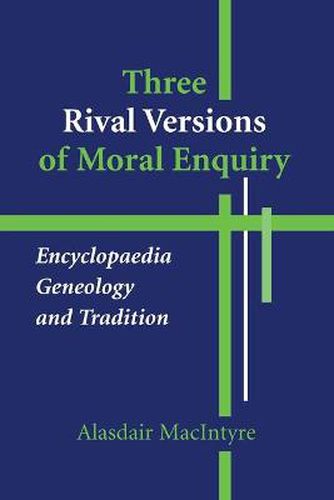Readings Newsletter
Become a Readings Member to make your shopping experience even easier.
Sign in or sign up for free!
You’re not far away from qualifying for FREE standard shipping within Australia
You’ve qualified for FREE standard shipping within Australia
The cart is loading…






Alasdair MacIntyre-whom Newsweek has called one of the foremost moral philosophers in the English-speaking world -here presents his 1988 Gifford Lectures as an expansion of his earlier work Whose Justice? Which Rationality? He begins by considering the cultural and philosophical distance dividing Lord Gifford’s late nineteenth-century world from our own. The outlook of that earlier world, MacIntyre claims, was definitively articulated in the Ninth Edition of the Encyclopaedia Brittanica, which conceived of moral enquiry as both providing insight into and continuing the rational progress of mankind into ever greater enlightenment. MacIntyre compares that conception of moral enquiry to two rival conceptions also formulated in the late nineteenth century: that of Nietzsche’s Zur Genealogie der Moral and that expressed in the encyclical letter of Pope Leo XIII Aeterni Patris.The lectures focus on Aquinas’s integration of Augustinian and Aristotelian modes of enquiry, the inability of the encyclopaedists’ standpoint to withstand Thomistic or genealogical criticism, and the problems confronting the contemporary post-Nietzschean genealogist. MacIntyre concludes by considering the implications for education in universities and colleges.
$9.00 standard shipping within Australia
FREE standard shipping within Australia for orders over $100.00
Express & International shipping calculated at checkout
Alasdair MacIntyre-whom Newsweek has called one of the foremost moral philosophers in the English-speaking world -here presents his 1988 Gifford Lectures as an expansion of his earlier work Whose Justice? Which Rationality? He begins by considering the cultural and philosophical distance dividing Lord Gifford’s late nineteenth-century world from our own. The outlook of that earlier world, MacIntyre claims, was definitively articulated in the Ninth Edition of the Encyclopaedia Brittanica, which conceived of moral enquiry as both providing insight into and continuing the rational progress of mankind into ever greater enlightenment. MacIntyre compares that conception of moral enquiry to two rival conceptions also formulated in the late nineteenth century: that of Nietzsche’s Zur Genealogie der Moral and that expressed in the encyclical letter of Pope Leo XIII Aeterni Patris.The lectures focus on Aquinas’s integration of Augustinian and Aristotelian modes of enquiry, the inability of the encyclopaedists’ standpoint to withstand Thomistic or genealogical criticism, and the problems confronting the contemporary post-Nietzschean genealogist. MacIntyre concludes by considering the implications for education in universities and colleges.